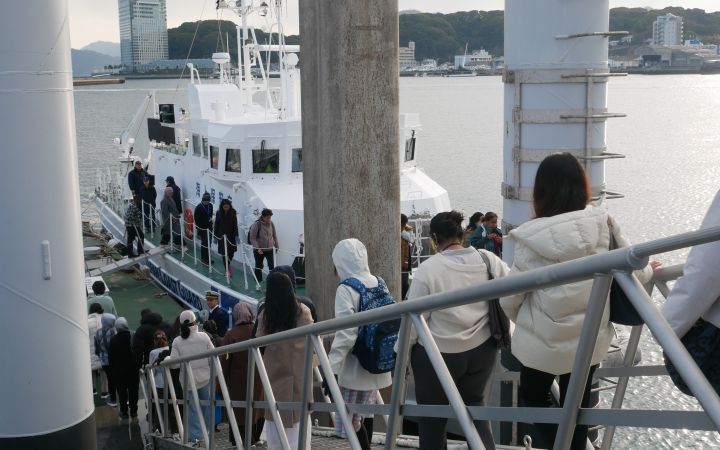Project Overview
The “Shimanami Collective: Sea and Human Security for a Free and Open Indo-Pacific” was a 12-month capacity-building initiative (March 2024 - March 2025) implemented by the United Nations Institute for Training and Research (UNITAR) Hiroshima Office (HO). It aimed to enhance knowledge and skills in sea and human security among government officials, civil society, and private sector actors from Pacific Small Island Developing States (SIDS) and countries from the Association of Southeast Asian Nations (ASEAN) The project was funded by Japan’s Ministry of Foreign Affairs and aligned with Japan’s Free and Open Indo-Pacific (FOIP) strategy.
The programme was delivered in three phases:
- Phase I – Online training (915 participants)
- Phase II – Regional in-person workshops in Jakarta and Nadi (152 participants)
- Phase III – Final workshop in Japan (50 participants)
Participants were selected progressively based on performance and project proposals. The training covered climate, environmental, economic, food, and maritime security, with a strong emphasis on interdisciplinary learning and regional cooperation.
Methodology
The evaluation used a mixed-methods approach, applying the OECD-DAC criteria and UNEG norms and standards. Methods included:
- Desk review of 100+ documents
- Post-training and evaluation surveys (173 responses)
- 31 semi-structured interviews
- An outcome mapping workshop during the final workshop in Japan (field visit)
Limitations included a short implementation period that limited the emergence of longer-term impacts and a lack of long-term outcome data, amongst others.
Evaluation Findings
1. Relevance
- Rating: Satisfactory
- The programme was highly relevant to participants’ professional needs and national priorities.
- The broad curriculum helped participants understand the interconnections between various security challenges.
- Some tension existed between the generalist approach and the specific needs of participants at different career stages.
2. Coherence
- Rating: Satisfactory
- The programme was built on previous UNITAR initiatives, especially the Women’s Leadership in Disaster Risk Reduction (DRR) programme.
- It complemented other regional and international efforts, including the SDGs, FOIP, and UN Sustainable Development Cooperation Frameworks.
3. Effectiveness
- Rating: Satisfactory
- Participants reported significant knowledge gains and increased confidence in applying skills.
- The phased hybrid model (online and in-person) was effective in fostering learning and professional networks.
- 518 project plans were submitted at the end of Phase I, with several already under implementation, particularly those closely aligned with participants’ ongoing professional roles or institutional mandates.
4. Efficiency
- Rating: Satisfactory
- The project was delivered on time and within budget (~$2.9 million).
- The online phase allowed broad reach, while in-person phases provided depth and networking opportunities.
5. Likelihood of Impact
- Rating: Moderately Satisfactory
- Early signs of impact include policy contributions, community projects, and career advancements, amongst others.
- Long-term impact depends on continued funding, institutional support, and follow-up mechanisms.
6. Sustainability
- Rating: Moderately Satisfactory
- Networks and individual projects show potential, but sustainability is uneven across countries and sectors.
- Participants’ ability to implement projects varies based on organizational support and resources.
7. Cross-Cutting Issues
- Rating: Moderately Satisfactory
- Gender equality, human rights, and environmental sustainability were integrated into the curriculum.
- Women were well-represented, especially in later phases. However, disability inclusion and tailored gender/human rights content could be improved.
Recommendations
- UNITAR should improve the formulation of project results statements, indicators, and theory of change.
- UNITAR should consider how to provide further interdisciplinary training programmes on issues related to sea and human security and closely collaborate with UN country teams and national actors.
- UNITAR should consider having distinct training programmes for potential leaders (e.g., in sea and human security and related topics), depending on career stage, and consider expanding training to institutions.
- UNITAR should consider, in future trainings on sea and human security and related topics in the region, having more gender and human rights training.
- In future programming, UNITAR should find ways to support participants in the “last mile” for implementation of projects, presentation of policy briefs, etc.
Lessons Learned
- A broad curriculum that highlights and emphasises the interconnections between topics in sea and human security fulfils a relevant niche and need.
- A phased approach to hybrid training helps to balance broad reach with targeted interventions.
- In-person and group activities are pedagogical tools as well as means to establish and strengthen personal connections.
- Sufficient time and a targeted communications strategy may be necessary to reach relevant demographics and to allow for entry into a phased training pipeline.


